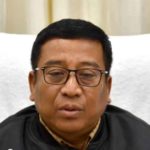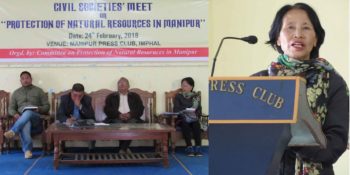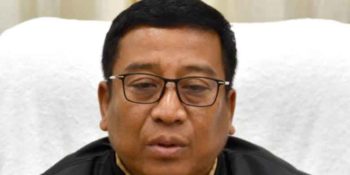Pothashang News Service : Imphal, February 24, 2018: The Committee on the Protection of Natural Resources in Manipur today organised a discussion on Protection of Natural Resources in Manipur at the Manipur Press Club, Imphal.
It took resolutions concerned with the ‘aggressive’ targeting of Manipur in India’s Act East Policy with subsequent push for extractive industries, hydropower projects, and infrastructure projects with increased involvement of neo-liberal forces, multinational corporate bodies and international financial institutions.
Aram Pamei, co-convenor, Citizens Concern for Dams and Development, Yumlembam Thoiba, convenor, Mapithel Dam Downstream Affected Peoples, Gainithoi Gonmei, general secretary Zeliangrong Baudi and Phulindro Konsam, convenor, Committee on Human Rights were graced as presidium members.
Mr. Jiten Yumnam, Secretary, Centre for Research and Advocacy, Manipur, providing key note address, shared that Manipur today confronts an increased development onslaught in the context of India’s pursuance of India’s Act East Policy.
Pamei Tingenlung, Convenor, Committee on the Protection of Natural Resources in Manipur shared that development has been forced on the people of Manipur. Oil companies like the Asian Oilfield, the Oil India limited and Jubilant Energy conducted oil surveys in Tamenglong and other parts of Manipur without taking the consent of indigenous peoples. The ongoing Trans Asian Railway Works also contaminated Rivers of Manipur. Indigenous peoples can no longer use the Rivers due to Railway works, Loktak project and other massive infrastructure project. The proposed construction of dams over the Barak and Irang Rivers will led to much hardship, displacement among communities and destroys their livelihood sources.
Aram Pamei shared that Manipur is very rich in Natural Resources. Unfortunately, multinational companies and the Government has been trying to exploit natural resources, primarily oil and mineral resources like Chromium and Limestone without considering the livelihood dependence of communities. Pursuance of extractive industries will unleash not only environment and social impact, but also multifaceted conflict among and within communities.
Dr Solemwon, convenor, Naga Peoples Movement for Human Rights, South, shared that development should be for the people with due consideration of their rights, wishes and aspirations. But peoples like Mapithel dam, pursued without peoples consent has affected more than twenty villages and has caused widespread displacement and livelihood impacts, while the project authorities remained unaccountable and irresponsible.

Yumlembam Thoiba shared that Mapithel dam unleashed livelihood impact on communities in downstream areas. The dam blocks the Thoubal River and affected communities sand and stone collection from the River, thus leading to their impoverishment. The project authority failed to conduct any detailed impact assessment and to create any alternative livelihood and rehabilitation measures for affected communities. Mapithel dam will be a failed dam. Mapithel dam is still leaking and villagers in immediate downstream like Tumukhong Village are worried of dam breaks.
Pratima, Secretary, Tumukhong Meira Paibi Lup shared Mapithel dam caused much suffering on the women of Manipur. Villagers are increasing finding it difficult to support the education of children. The plan to commission Mapithel dam without addressing the livelihood and survival impacts of affected communities is highly unfortunate and the government of India and Manipur should desist from commissioning Mapithel dam and the Thoubal River should be allowed to flow free.
Gainithoi Gonmei shared that oil exploration will unleash multifaceted impacts, including environment, social, cultural, economic, health impacts. Oil exploration will unleash much devastation on the land and resources.
Haobijam Joy of Loktak Project Affected Areas Action Committee shared the impacts of the Ithai Barrage of 105 MW Loktak Hydroelectric Project, which submerged more than 80,000 acres of agriculture land. The project authority, the National Hydroelectric Power Corporation remained unaccountable for the devastation and the violations.
Dhana, president, All Manipur Progressive Farmers Association shared on the need for protecting agriculture land from all destruction and unsustainable development projects.
Phulindro Konsam stressed on the need for respecting and advancing indigenous peoples rights in the pursuance of any development processes in Manipur.
The discussion resolved to affirm that indigenous peoples have the exclusive and intrinsic rights over their land and natural resources, including to sustainable manage and use their land and resources as per their wishes, aspirations and self-determined rights.
It resolved that all plans to drill and explore oil and gas without the free, prior and informed consent of indigenous peoples of Manipur should be withdrawn. All production Manipur sharing contract and Production Exploration License signed by the Government of India and Government of with Oil Companies like the Jubilant Energy, Oil India Limited, Asian Oilfields etc should be revoked. The Government of Manipur should not permit any oil exploration activities without recognizing peoples’ rights over land and resources and without considering the multifaceted and long term impacts.
The MoU’s signed with the Seven mining companies for Chromium and Limestone mining in Ukhrul and Chandel Districts in November 2017 should be revoked, as the Government of Manipur and the mining companies failed to recognize communities rights over their resources and to take their free, prior and informed consent. No detailed impacts of mining have ever been conducted so far.
The state government should desist from commissioning Mapithel Dam and the Dolaithabi Barrage and consider how Khuga Dam and Khoupum dam etc lay failed after commissioning without completing the major infrastructures for water supply, irrigation and power supply etc is premature and irrational.
The Ithai Barrage of Loktak project should be decommissioned considering the multifaceted and irreparable impacts of the project for failing to consider the longstanding demands of communities in and around Loktak wetlands.
The NHPC’s decision to build Loktak downstream project to produce 66 MW poer is a disrespect of peoples’ rights and call. Controversial policies, like the Manipur Hydro Power Project, 2012, Manipur Loktak Lake Protection Act, 2006 etc should be repealed for its targeting of peoples land, forest, rivers and other resources as mere source of power and profit for corporate bodies and also for restricting communities rights and access to their traditional land and resources.
The MoU’s signed by the government of Manipur with North Eastern Electric Power Corporation and the NHPC for construction of mega dams like the 1500 MW Tipaimukh Multipurpose Hydroelectric Project, the 60 MW Irang Dam, 190 MW Pabram Dam, the 67 MW Khongnem Chakha Dam, Tuivai Dam, the Nungleiband Dam, Chakpi Dam etc over the Barak River, the Irang River, Chakpi River etc without consent of indigenous communities should be scrapped altogether.
The Northern Frontier Railways, corporate bodies and the government should stop destruction of peoples land, forest and contamination of water sources in Tamenglong and other areas. Railway companies and Government should stop harassing villagers for seeking their rights and justice.
The discussion also concerned with the increased financing of multilateral and bilateral financing institutions like the World Bank, Asian Development Bank, Japan International Cooperation Agency etc, for financing infrastructure projects like road projects, water supply, high voltage transmission and distribution lines etc to facilitate the expropriation and plunder of Manipur’s land and natural resources.
Express concern that the pursuance of extractive industries, hydropower project and other related infrastructure projects led to increased militarization and targeting of indigenous community leaders and organizations in Manipur under the Armed Forces Special Powers Act, 1958 (AFSPA) and other criminal laws. The discussion called for repeal of AFSPA, 1958 and to demilitarise Manipur.
The participants urged upon the Centre and the state government, corporate bodies and all international financial institutions to fully recognize indigenous peoples’ rights over their land and resources and to fully respect their right to self-determined development, especially to take their free, prior and informed consent before pursuing any unsustainable and destructive development projects in their land and territories.
All provisions of UN Declaration on the Rights of Indigenous Peoples, 2007 should be fully implemented in Manipur for decisions affecting indigenous peoples land, lives, rights and their future, decided the gathering.












